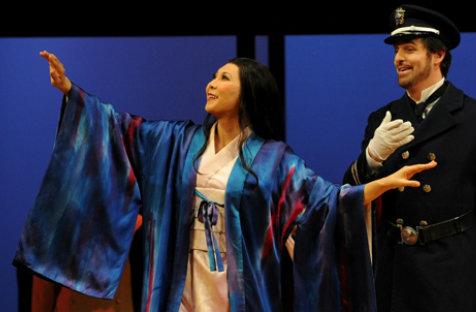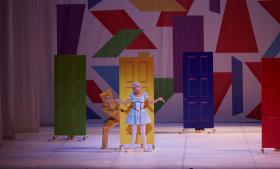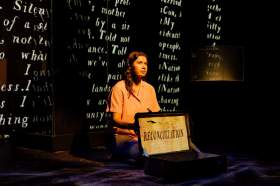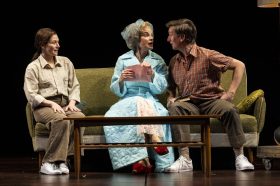Puccini’s Madama Butterfly is frequently staged but some will be more acquainted with it via TV, especially Ken Russell’s highly politicised interpretation, or from recordings such as the production featuring Mirella Freni and Lucia Pavarotti, conducted by Herbert von Karajan, and generally held to be the best available on CD.
This Opera Australia revival of their 1997 Madama Butterfly, directed by Moffatt Oxenbould and conducted by Giovanni Reggioli, is stunning.
Japanese-born soprano Hiromi Omura is just right. The delicacy of her features compliment the delicacy of her character; she is a singer who can act, so her every movement amplifies the narrative. Omura effortlessly conveys the naivety of Butterfly and her unchallengeable confidence that marriage to the American naval lieutenant, B F Pinkerton, will be fulfilling and enduring and lift her out of poverty, and that Pinkerton completely reciprocates her love.
Equally evident is the cynical opportunism of Pinkerton, a man with a girl in every port.
Since the opera was first performed at La Scala in Milan in 1904, and US-born characters are still rare in opera (even rarer back then) the audience is left in no doubt that Pinkerton was intended to embody US imperialism and old white attitudes to Asian nations. It comes as no surprise, then, that those national characteristics were recognised 110 years ago, during the term of that most imperialist of US presidents, Theodore Roosevelt.
Then there is the appeal to Butterfly that she should give up the son Pinkerton had fathered for the good of the child. It is an argument identical to the arguments for the removal of children from their sole or underprivileged parents or from Indigenous families. These policies gave Australia two stolen generations: one of Indigenous people, another of kids forced out to adoption.
But there’s a brutal irony in the story, one that librettists Luigi Illica and Guiseppe Giacosa could never have anticipated back in 1903. The opera is set in Nagasaki, probably in the early 1890s. In the signature aria, One Fine Day, Butterfly sings of seeing wisps of smoke on the horizon, announcing Pinkerton’s return to his wife and child.
One fine day in August 1945, the wisps on the Nagasaki horizon were contrails from a high flying aircraft. They announced the arrival of Americans bearing the atomic bomb. Some will never hear that aria again without thinking of that fact.
This production of Madama Butterfly was full of new experiences and insights, and as Butterfly dies by her own hand – ‘die with honour when you can no longer live with honour…’ – there were tears in the eyes of many in the audience.
Then, affirming the audience’s engagement with the tragedy of the opera, when James Egglestone, who plays Pinkerton, swept on stage to take his curtain call, he was greeted by a mixture of applause, boos and hisses: applause for the singer and the performance, and condemnation for the character.
A remarkable and special night at an excellent production of Madama Butterfly.
Rating: 4 ½ stars out of 5
Opera Australia presents
Puccini’s Madama Butterfly
Conducted by Giovanni Reggioli
Conductor: Giovanni Reggioli
Director: Moffatt Oxenbould
Set & Costume Designers: Peter England & Russell Cohen
Lighting Designer: Robert Bryan
Movement: Matthew Barclay
Orchestra Victoria
Opera Australia Chorus
Cast: Hiromi Omura, James Egglestone, Sian Pendry, Barry Ryan (until 29 November), Michael Honeyman, Graeme Macfarlane, Jud Arthur and Samuel Dundas
State Theatre, Arts Centre Melbourne
Until 14 December





